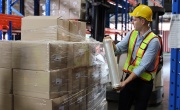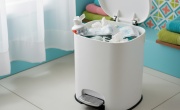Mercedes-Benz opens hydrometallurgical battery recycling facility
New plant in Kuppenheim, Germany targets 96 per cent recovery rate for critical materials including lithium, nickel and cobalt.
 Mercedes-Benz has opened a new battery recycling plant in Kuppenheim, Germany that uses a mechanical-hydrometallurgical process to recover materials for new electric vehicle batteries.
Mercedes-Benz has opened a new battery recycling plant in Kuppenheim, Germany that uses a mechanical-hydrometallurgical process to recover materials for new electric vehicle batteries.
The facility separates plastics, copper, aluminium and iron from old batteries, as well as individually extracting lithium, nickel and cobalt through chemical treatments, with the aim of reintegrating these materials back into the battery supply chain.
The hydrometallurgical process uses chemicals, such as sulfuric acid, to dissolve the ‘black mass’ of metal oxides, consuming less energy and creating less material waste than the pyrometallurgical approach.
A photovoltaic system on the roof is expected to provide over 350 kilowatts of power to the factory. Mercedes-Benz has committed to operating on carbon-neutral principles, drawing all electricity from renewable sources.
The Kuppenheim facility has an initial annual processing capacity of 2,500 tonnes and aims to produce more than 50,000 battery modules from the recovered materials, with an anticipated recovery rate of more than 96 per cent.
Discussing the new plant, Ola Källenius, Chairman of the Board of Management of Mercedes-Benz Group AG, said: “Europe's first integrated mechanical-hydrometallurgical battery recycling factory marks a key milestone towards enhancing raw-materials sustainability.”
Mercedes-Benz developed the plant with Primobius, a joint venture between German plant and mechanical engineering company SMS group and Australian process technology developer Neometals.
The project has been partly funded by the German Federal Ministry for Economic Affairs and Climate Action, as part of a research project with three German universities looking at the entire process chain for battery recycling.
Olaf Sholz, Federal Chancellor of the Federal Republic of Germany, commented: “The future of the automobile is electric, and batteries are an essential component of this. To produce batteries in a resource-conserving and sustainable way, recycling is also key.”
The Kuppenheim plant comes after the opening of the Mercedes-Benz eCampus in Stuttgart-Untertürkheim in July 2024. The eCampus was created to develop chemical compositions and optimise production of new battery cells.
Jörg Burzer, Member of the Board of Management of Mercedes-Benz Group AG, responsible for Production, Quality & Supply Chain Management, explained that the two sites would be working together: “Following the opening of the Mercedes-Benz eCampus for development of new battery cell chemistries in Stuttgart-Untertürkheim, we are now sustainably closing the raw materials loop in Kuppenheim.”






